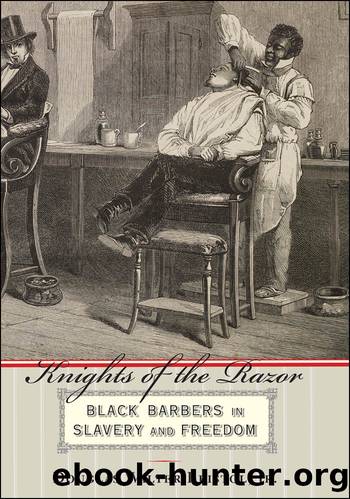Knights of the Razor by Douglas W. Bristol Jr

Author:Douglas W. Bristol Jr.
Language: eng
Format: epub
Publisher: Johns Hopkins University Press
Published: 2009-01-15T00:00:00+00:00
Poor black barbers appear to have viewed barbering as part of a repertoire of jobs they could use to survive. The Convict Description Dockets of the Philadelphia County Prison contain hints about what kinds of work these men took up. At a time when âtattoos were virtually never seen save on the weather-beaten skin of a seafaring man,â prison clerks noted that several black barbers in the prison had extensive tattoos. One of these men even bore a crude design that resembled a ship. Black men formed a substantial portion of Philadelphiaâs seamen, and black sailors may have worked as black barbers and vice versa. Perhaps barbering was a way station for black men who had recently migrated to the city. Nineteen-year-old black barber David Brown must have only recently moved from Lancaster, Pennsylvania, when he checked into the Philadelphia Almshouse, since his home county assumed responsibility for the cost of his medical treatment.39 These examples of down-and-out black barbers in Philadelphia are extreme cases of hardship in the region of the nation where immigrant barbers had made their greatest inroads on the trade. Nevertheless, they illustrate the very different prospects of ordinary black barbers and those working in first-class barbershops.
Up until the 1850s, black barbers had led a charmed existence when compared to other free skilled black men. They had plenty of white customers, even in the North, long after other black tradesmen despaired of finding work. Their fellowship as knights of the razor encompassed black barbers across the nation, lessening the isolation of prominent free black men in the lower South such as William Johnson. Although black barbers in each region faced growing white hostility in the 1830s and 1840s, they weighed their options and then plainly decided that this trade remained their best bet. However, the growing sectionalism of the 1850s and increasing tendency for whites to lash out at free African Americans, combined with the first serious competition from immigrants, made it impossible for barbers to continue being exceptional among black workers and artisans.
The passage of the Fugitive Slave Act in 1850 caused some African Americans in the North to again consider leaving the United States, a sign that they were losing faith that they would win acceptance and prosperity in this country. There were black barbers among the emigrants, and several actually led a group of several hundred who fled to Canada. The Fugitive Slave Law obligated local law enforcement officials to help capture runaway slaves. After prospering in Buffalo, operating the barbershop in the elegant Niagara Hotel, Henry Thomas began to worry that his status as a fugitive slave from Tennessee might catch up with him. When a Tennessee slave owner visited his shop and remembered him from Nashville, Thomas realized that his origins were known, so he could be recaptured. Thomas helped organize a meeting in Buffalo of free African Americans to denounce the new law. He gave the first speech and helped draft resolutions that declared the law unconstitutional and asserted that it placed every African American in the North in danger of being enslaved.
Download
This site does not store any files on its server. We only index and link to content provided by other sites. Please contact the content providers to delete copyright contents if any and email us, we'll remove relevant links or contents immediately.
| Americas | African Americans |
| Civil War | Colonial Period |
| Immigrants | Revolution & Founding |
| State & Local |
In Cold Blood by Truman Capote(3374)
The Innovators: How a Group of Hackers, Geniuses, and Geeks Created the Digital Revolution by Walter Isaacson(3146)
Steve Jobs by Walter Isaacson(2889)
All the President's Men by Carl Bernstein & Bob Woodward(2363)
Lonely Planet New York City by Lonely Planet(2217)
And the Band Played On by Randy Shilts(2197)
The Room Where It Happened by John Bolton;(2150)
The Poisoner's Handbook by Deborah Blum(2135)
The Innovators by Walter Isaacson(2098)
The Murder of Marilyn Monroe by Jay Margolis(2095)
Lincoln by David Herbert Donald(1982)
A Colony in a Nation by Chris Hayes(1927)
Being George Washington by Beck Glenn(1912)
Under the Banner of Heaven: A Story of Violent Faith by Jon Krakauer(1788)
Amelia Earhart by Doris L. Rich(1689)
The Unsettlers by Mark Sundeen(1682)
Dirt by Bill Buford(1670)
Birdmen by Lawrence Goldstone(1662)
Zeitoun by Dave Eggers(1643)
